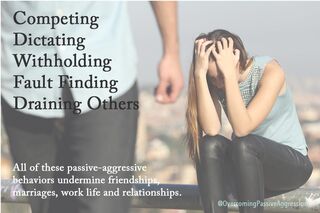Friends
What Undermines Romance, Marriage, Even Friendship
Remove or improve these five habits for better relationships.
Posted March 24, 2021 Reviewed by Ekua Hagan

The pandemic, with unmarrieds moving into quarantine and marriages maxing out under the same roof, took a toll on patience with poor behavior. Resentment, especially, kills a couple’s sex life.
The frustrating conduct that grates on nerves isn't new. In Overcoming Passive-Aggression: How to Stop Hidden Anger From Spoiling Your Relationships, Career, and Happiness, my co-author and I present frenemy behavior that fractures friendships and families. Here are five:
Competition
Do friends or family fail to comment on your positive social media posts? In private, are they quick to outdo, have the last word, prove points or be right? Those who must have or be more, usually feel a nagging insecurity. That self-doubt leaves little room for other people’s solutions. And it moves them into all or nothing thinking, which is unwise.
The Fix: Stop running an imagined race. The finish line has room for several great ideas and wonderful contributors. Compliment others’ choices, their achievements. Be more positive, supportive, admiring, and encouraging. Make your attempts public. If doing so stretches you out of your comfort zone, you will grow from it.
In your own communication, focus less on crowdsourcing your decisions. Be content with your own ability to make good choices. Accept what makes you unique. Limit social media because it’s much like the back of an alumni magazine: fewer posts of struggle and far too much glossing over reality.
Dictating
Know of any couples where one party says jump and the other inquires how high or by action alone enables the dominance? In dating, friendships, or marriages, one person might excel at idea generation and planning. In my experience as a therapist, a one-sided approach, over time, leads to hidden anger, frequent arguments, long-term resentment, and sadly, divorce.
The Fix: Realize that dominance elevates self over others. When one person’s wishes, friends, family, or interests take primary importance over the other person, you are dealing with control skewed one way. This will not end well.
If you’re the wallflower, speak up. Become assertive (not passive nor aggressive). Show some backbone. Stop circular conversations where you always give in, capitulate, or appease.
Those needing to have sway: Know that control stems from deep inner needs, fear, or avoidance. As we chart in Overcoming Passive Aggression, the fears can be of chance, risk, being blamed or hurt, losing, failure or dependence. Maintaining the upper hand may seem fine; long-term, it risks your happiness. Dive out of your comfort zone and let someone else choose, plan, have his/her way. You’ll likely be surprised it may benefit you.

Withholding
When you say one thing and do another, you withhold your genuine self. It’s silence, concealing one thing largely out of insecurity, need, fear or something avoided. Most of us pay attention to what we see vs. what we hear. In couples, the two main culprits are withholding communication and sex.
The Fix: Match what you say with what you do. This spells congruence. When you spot withholding, call out discrepancies and think about what causes them. If you’re indirect, practice being direct. Use I-messages to start sentences and a soft start-up to tough conversations. Embrace being open, honest, and more intimate.
Fault-Finding
Relationships with a 5:1 ratio of positives to negatives thrive. Those filled with negativity do not. Anyone who lives or works with another is bound to get annoyed periodically; how you deal with that frustration tanks interactions or makes them succeed.
The Fix: If you feel the need to finger point in order to defend yourself, work on that. Defensiveness is one of the four horsemen of John Gottman’s apocalypse, along with criticism, contempt, and stonewalling. These four undermine any relationship’s health and longevity—not just for couples but friends, coworkers, in-laws, you name it.

Fault finders often have the mistaken belief that by putting others in “their place,” they spotlight themselves. Humiliating others isn’t classy, functional, or friendly. It’s an underhanded, often self-absorbed behavior that destroys.
Draining Others
Know people that squeeze the life out of you? Their harping, nagging, negative nay-saying drains your body and soul, certainly over time. When you focus on what others say or do, what they have, or their reactions, you give up real estate in your own brain—energy you could put to better use figuring out your future. This stems from neediness, way too much self-doubt, and dependence.
The Fix: Empathy is one thing. We’ve all needed it. With a shoulder to lean on or a helping hand, a functional individual recoups strength, determination, and agency for himself or herself after going through a tough time.
On the other hand, too much giving, bending yourself to accommodate others, too many bent ears listening to gossip or irrational beliefs veers us into enabling passive-aggressive behavior or even becoming a part of that negative cycle ourselves. Unsure where the line is? Look at motive and outcome. If both are good, you’re probably in safe territory. If the motive is manipulative, lazy, grandiose, or negatively affects others in the long run, stop the behavior.
Passive-aggression shows up in verbal sparring, excessive sarcasm aimed at tearing someone else down while perhaps you falsely think it improves your standing or appearance. It can be voiceless as well with callous gestures or off-putting body language.
All told, passive aggression sneaks up over time causing a buildup of anger to where the smallest thing may spark a greater implosion (maybe health consequence) or an outward explosion. The best remedy is to clean up any passive-aggressive, negative words or actions to prevent this bitter cycle from happening all over again next time.
Copyright @ 2021 by Loriann Oberlin. All Rights Reserved.
Related Reading:




